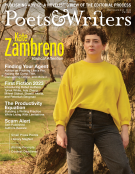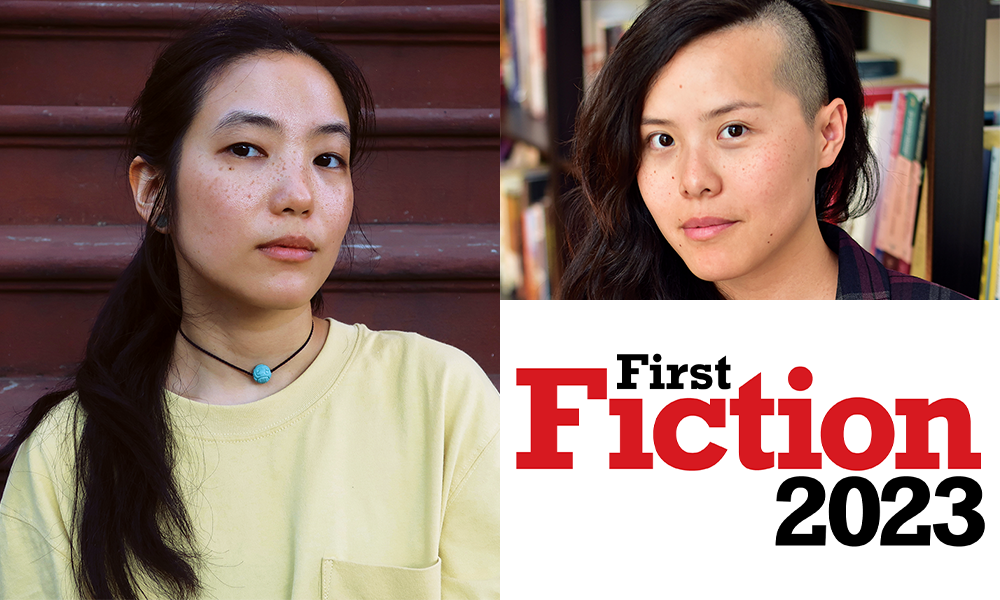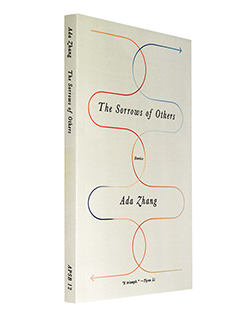Ada Zhang, whose debut story collection, The Sorrows of Others, was published by A Public Space Books in May, introduced by Kim Fu, author of four books, most recently the story collection Lesser Known Monsters of the 21st Century, published by Tin House in 2022. (Credit: Zhang: Chloe Chang)
![]()
As I read each story in Ada Zhang’s brilliant collection, The Sorrows of Others, within the first few paragraphs—sometimes the first few sentences—I felt I understood the characters intimately and profoundly, such that every choice they made, no matter how radical, ill-advised, or baffling to those around them, seemed inevitable and true to me. It’s tempting to chalk this up to shared cultural experience, to say that I saw myself in one story’s self-destructive Chinese American teenager on a hot May night in Texas, or my parents in another story’s newly immigrated couple grimly reinventing themselves over green bean casserole, or my grandparents in the shadows and silences created by the Cultural Revolution in these stories. But this would be facile and untrue. I felt this way because Zhang is a master of character and interiority, what it is to be a person: every gesture and perception colored by a lifetime of memory, the privacy and singularity of the mind, the irreducible multitudes contained within. This is a debut with the subtlety, confidence, and range of a seasoned writer. When these characters speak past each other, when they confound and misunderstand each other, when the story they tell isn’t the story that’s heard, when they look in the same direction and each see something completely different, I felt so acutely that impassable gulf between bodies, that unknowability, even as I marveled at literature’s capacity—and, more specifically, Zhang’s gift as a writer—to transcend it.
The opening story, “The Subject,” about a young artist who interviews and paints her elderly roommate, deals directly with questions of representation—whose images and stories are considered worthy of artistic attention and who gets to tell those stories. Did those questions inform the writing of The Sorrows of Others more broadly? What was the significance of having this story as the first one the reader encounters?
I suppose questions around representation did inform the writing of the book in that I tried very hard to write against representation, to be aware of its shortcomings and avoid its pitfalls. Representation, as it is understood in our modern discourse, places an unfair burden on artists from marginalized communities to write universally, which is the exact opposite of what I believe about making art: that it should come from specificity, and that only in capturing something specific—a detail about the world—can the work be appreciated by anyone.
I knew how easy it would be for my book to be labeled a book about the immigrant experience or about the Asian American experience. These have become marketing terms, almost, in the publishing industry, and it bothered me that my stories might be subject to this limited reading. Since I could not—cannot!—avoid representation, I decided to write a story about it. In drafting “The Subject” I was able to give my questions on this topic to the main character, to let the story do the asking. I wanted this particular story to come first to encourage readers toward a more sophisticated reading of the stories that follow and of the collection as a whole. My characters all happen to be Chinese or Chinese American—but is that really what the book is about? I can’t control how people will receive the book or how it will inform their ideas. But “The Subject” as the opener was my attempt at not letting readers, or myself, off the hook.
What are some of the other through-lines and thematic connections across the stories you hope a reader will draw? Were any overarching themes or sustained interests clear to you while writing the individual stories, or did that come later in the process of assembling the collection?
I have always been interested in the limitations of language as a medium for human connection. I enjoy writing dialogue for that reason. So much is revealed to me about the characters in what they say or don’t say to one another, what they hide intentionally or are unable to express for whatever reason. There is often some distance—whether generational or cultural or the simple fact of life pulling people apart—that my characters must speak across to reach one another. It’s this reaching that fascinates me, the risks we will take to know and be known by another person.
Each story in the collection was pursued on its own terms; only later, when I was assembling the collection, did I realize I was kind of writing about the same thing over and over. These stories feature lonely characters, and it comforts me—makes me feel less lonely—to think of them together. When I get mired in my own life, it helps to remember that somewhere, someone is asking the same questions I am and that everyone has a story.
I often found the final line or lines of these stories especially elegant, both the prose itself and the emotional resonance with the story as a whole. There’s a moment in “Silence” when a character thinks, “Every story relied on one preceding it, which made a story told in isolation a lie and one told in its entirety basically impossible,” which I think speaks to one of the biggest challenges of the form. How do you know where to end a story? Do you have an ending in mind and write toward it, or does it become inevitable along the way? Do you consider multiple possibilities?
I don’t have an ending in mind when I set out. I have to trust that the sentences are taking me where the story wants to go, though just as often they lead me astray. For half the stories in the collection, the endings were found during revision, sometimes multiple drafts. The other half kept their original endings, and the revision was about making sure everything prior prepares the reader for that final moment. In drafting I might make contact with an idea or an obsession, but revision is really when the story becomes clear. If it were up to me, I would choose revising over drafting any day! It’s just too bad you really need to see all the pieces before you can start moving them around. A short story ending, I think, should feel big enough to contain the parts of the story that come before but small enough to pass as just another detail.
What draws you to the short story form in general?
The short story is mysterious. That’s what excites me about it. It’s a form that’s allergic to formula, that invites experimentation and rewards risk for those who really go for it. I like the honesty it demands from me, and the rigor. That’s the craft answer, but I fell in love with short stories first as a reader. They’re still my favorite things to read. I read slow naturally but have found that the form encourages a more drawn-out attention in which you aren’t racing to find out what happens next but waiting, rather, for what’s inevitable. That particular kind of suspense I enjoy, and I hope my readers will enjoy it, too, in my collection.
Who are some of the short story writers you love to read? Were any of them particularly influential to this collection?
The list of short story writers I love is long and continues to grow. I feel like we’re in a golden age of short story collections right now. More and more people are reading them, refuting the idea long held by publishers that short stories don’t sell. I love seeing how different writers interpret the form. Recent favorites include A House Is a Body by Shruti Swamy, How to Love a Jamaican by Alexia Arthurs, and A Lucky Man by Jamel Brinkley. The short story writer most influential to this collection has to be Yiyun Li. I started reading her work in college and have revisited A Thousand Years of Good Prayers and Gold Boy, Emerald Girl numerous times since. I read one of her short stories, “A Sheltered Woman,” out loud to my father once many years ago. When I first became interested in writing, my father advised me not to write about Chinese people. He didn’t think my work would find an audience. He was visibly startled after I finished reading, as I was, too, the first time I was introduced to Li. He couldn’t believe that lives like ours could be the subject of art. I think that’s when my dad realized he was my audience and maybe that was reason enough for me to keep writing. After I had published a couple of stories in literary journals, people started telling me that my work reminded them of William Trevor. So I started reading William Trevor, learning embarrassingly late that he is in fact Yiyun Li’s favorite writer. It’s exciting to uncover one’s literary DNA and to feel like you’re never writing alone, because you’re always writing into a tradition and carrying that tradition forward. Other writers in my DNA include Alice Munro, Eudora Welty, Edward P. Jones, and James Alan McPherson.
An excerpt from The Sorrows of Others
“One Day”
On a random weekday in November, when I was a child and not yet weary of his kindness, my father drove forty minutes from his workplace to have lunch with me in the school cafeteria.
Handprint turkeys lined the halls of the school’s first floor, from the entrance up to the library, then splitting in two directions down the various homerooms of K through third. Each little turkey was cut from a paper plate. Each colored brown in the palm, the turkey’s chest, with a flash of red below the beak, the part we called the turkey’s gobble. In the center we’d written our names. Eric, James, Annabelle…
“Helen,” my father read out loud when he found mine.
He touched the fingers, which I’d decorated in orange and brown feathers and nothing else. The other turkeys were more exciting. Feathers in pink and blue and purple, plus glitter and sequins, pom-poms with bits of tinsel—but mine was the most realistic, I thought. During the craft, it had bothered me that no one else seemed to care about this. “Use your imagination, Helen!” Ms. Evans had said, but my imagination, I wanted to tell her, had rules. Even in kindergarten, it seemed plain to me that certain things were not possible.
“It’s super,” my father said, looking down at me. He smiled and touched the back of my head. “Are you hungry?”
In the cafeteria I scanned the mayhem, all those bodies in one fluorescent gray room, until I caught Ms. Evans, her stubby fingers spread wide and waving at me as though her explosion of hair or outfit wouldn’t have given her away. I didn’t have friends. Ms. Evans was always making efforts to include me, fold me in with the other kids, but I took my cues from adults, the other teachers, and I maintained a separation between me and her. The cafeteria smelled as it always did, of something fried and something sour. My classmates with packed lunches were already seated with their sandwiches, their baggies of grapes and baby carrots. Everyone else was in line, where I would have been, too, sliding a tray of pizza with a side of mashed potatoes, if on that day my father had not come and surprised me.
At the far end of the table, where no one was sitting yet except for us, he removed two clear containers from his lunchbox, both pocked with moisture on the inside. He looked around, then raised his hand in the air as though he were one of us, a student. He winked at me, sitting across from him, and I tried to wink back. Ms. Evans was down one table, monitoring a different homeroom. She saw my father and made like she was running. Her pants swished. Her enormous arms rolled from side to side.
“Yes, Mr. Chen?” she said, out of breath.
“Is there a microwave somewhere so I can heat up our food?”
“Sure, if you come with me I can take you to the teacher’s lounge right down the—”
Just as she finished the last word, Ms. Evans threw her head back and sneezed, sending one of her silver hoop earrings slicing through the air to the ground near our feet. The noise was so loud, the convulsion of her body so huge and terrifying, that I ducked and covered my face. My father tapped my knee three times before I moved my elbows away, before Ms. Evans could notice.
“Bless you,” he said, and reached under the table.
When he resurfaced a moment later, Ms. Evans was blinking rapidly with wide, open eyes, like she’d just appeared someplace new. She sniffed, and instead of taking the earring my father had retrieved, she cocked her head sideways to remove the other hoop from her other ear.
“These things never stay in,” she said. She spoke as though forced into admission. “They’re cheap.”
“They look nice on you,” said my father. After a pause he added, “Cheers,” lifting the earring to my kindergarten teacher, the hoop held solidly, daintily, between his thumb and index finger, in the signature for Okay!
Ms. Evans gasped. She let the breath go in a soft, choppy laugh, exposing something fragile, and I got the sense that for Ms. Evans, life had turned one way, the wrong way, a long time ago and now could not find its way back.
“Cheers,” she said.
They clinked hoops, making a dull, disappointing sound.
![]()
We ate noisily and with our heads down, chopsticks flicking, the way we ate at home. By then the lines had cleared and the tables were full. The boys sitting next to us stared, and I thought nothing of it. My world was still too small for me to feel ashamed.
“What you did earlier, Helen,” my father began once we were finished. “It wasn’t nice.” He stacked the empty containers on top of each other and pushed them aside. “You could have hurt your teacher’s feelings.”
I said, “I know.”
My father began peeling an orange and carved the fruit out in seconds, in one tremendous sweep of his thumb. He broke it in half and gave one to me.
I wonder if he suspected then that I was beginning to detect weakness and to feel repulsed by it. “Helen is such a sweet girl,” my father was always telling everyone. Over the years it became clear to me that he’d interpreted my reclusiveness for loneliness, my brooding for sophistication, when actually I was, as a child, already sick of the world and hardening myself to it, so it could never do to me what it had done to Ms. Evans. What it had done to my father, who raised me on his own. I thought he was too good for the feckless types on whom his charms were most effective, until eventually I viewed him as one of them, someone who did not know how to make life easier.
I left home when I was eighteen and remained distant until he got sick. When I returned, I watched a man turn into a gnarled, hollowed body, as though someone had taken a spoon to his skin and scooped out the flesh, and I knew, before being told, that something so small and destroyed could not survive. I’ve learned to be softer now, but there remains a frayed thread of that part of me from before. At times I feel it writhing—in my intolerance for slowness, my impatience—even though now I’m someone’s partner and a mother to two children. I was twenty-five when he died.
“Don’t go,” I said to him when lunch was over. We were standing near the school’s entrance. All around us, kindergarteners were filing out of the cafeteria. First graders were making their way in, a scene repeating itself.
“Baba has to go back to work. I’ll see you in a few hours at home.”
“But I don’t want to be here,” I said. The idea of resuming an ordinary day filled me with dread. “I want you to be with me.”
My father knelt down. He aligned my hand to his in a still high-five and said, “Look! My turkey’s so much bigger than yours.”
When I said nothing, he draped my arms over his shoulders. “You’ll make friends, I promise you,” he said. “It gets better.”
He kissed me firmly on the forehead, and I watched him leave. There was a spring in his step, the gait of someone strong and healthy. Ms. Evans came and stood with me by the glass doors, and to my surprise she did not turn me away. It wouldn’t occur to me until I was an adult that, probably, no one had ever raised a toast to Ms. Evans before, that my father was likely the first, perhaps the only. Before that I couldn’t appreciate the perfect strangeness of their encounter. Together we watched him get into his car and drive. I stared out even after he was gone, until I felt ready, then Ms. Evans walked me back to class.
Excerpted with permission from The Sorrows of Others by Ada Zhang. Copyright Ada Zhang, 2023. Published by A Public Space Books in May 2023.










